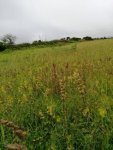limestonelil
Well-Known Member
One of our old tiny fields we take hay off was full of rattle in places this year. I remember other HHOs had this too.Now I'll find the rattle stems carefully pushed aside and all the other hay gone. Anyone else got this? I've not tried nibbling a bit myself to test flavour, a lot of old traditional meadow plants do taste alright from past nibbling investigations.

